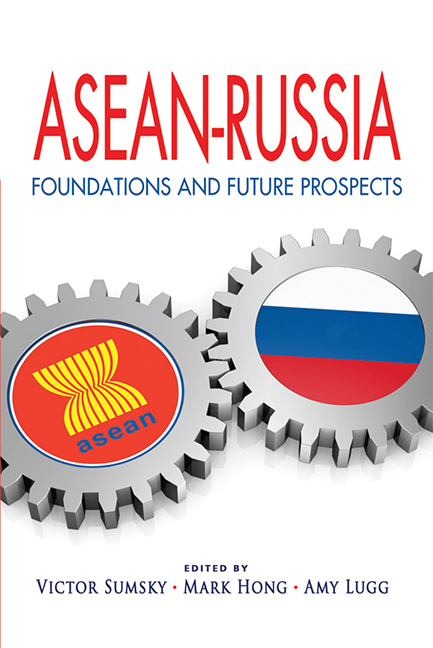Book contents
- Frontmatter
- Contents
- Foreword
- Preface
- About the Contributors
- Keynote Address
- Opening Remarks
- Keynote Address
- Introduction: Russia and the ASEAN Member States: Political and Economic Cooperation in Progress
- SECTION I WISEMEN'S VIEWS
- SECTION II GEOPOLITICS
- Russia in Southeast Asia: A New “Asian Moment”?
- ASEAN-Russia Military Ties: Reconfiguring Relations
- The Enlargement of the East Asia Summit: The Reasons and Implications of Bringing Russia In
- Russia's Entry into ASEM: Not Just a Courtesy Call?
- Russia-India-China: Acting in Concert in Southeast Asia?
- The South China Sea Issue: A View from Russia
- Southeast Asia and Russia: Forging a New Regional Architecture
- Russia-ASEAN Relations: An Indian Perspective
- SECTION III BILATERAL RELATIONS
- SECTION IV Business and Economics
- SECTION V CULTURE AND EDUCATION
- EPILOGUE
- Index
Russia's Entry into ASEM: Not Just a Courtesy Call?
from SECTION II - GEOPOLITICS
Published online by Cambridge University Press: 21 October 2015
- Frontmatter
- Contents
- Foreword
- Preface
- About the Contributors
- Keynote Address
- Opening Remarks
- Keynote Address
- Introduction: Russia and the ASEAN Member States: Political and Economic Cooperation in Progress
- SECTION I WISEMEN'S VIEWS
- SECTION II GEOPOLITICS
- Russia in Southeast Asia: A New “Asian Moment”?
- ASEAN-Russia Military Ties: Reconfiguring Relations
- The Enlargement of the East Asia Summit: The Reasons and Implications of Bringing Russia In
- Russia's Entry into ASEM: Not Just a Courtesy Call?
- Russia-India-China: Acting in Concert in Southeast Asia?
- The South China Sea Issue: A View from Russia
- Southeast Asia and Russia: Forging a New Regional Architecture
- Russia-ASEAN Relations: An Indian Perspective
- SECTION III BILATERAL RELATIONS
- SECTION IV Business and Economics
- SECTION V CULTURE AND EDUCATION
- EPILOGUE
- Index
Summary
INTRODUCTION
The global financial crisis has highlighted significant imbalances in the modern developmental pattern of many states. It has become a test for the global political and economic system, for the old and new regional centres of power. In this context, many countries have started to look around for more opportunities in terms of international economic cooperation.
When the group of emerging economies came to the fore during the early crisis period, it was a clear sign that geo-economics was going to play a central role in international relations. The new growth centres are not so much individual spearhead countries, as nations forming networks of economic and political relationships in the regions they belong to. East Asian emerging markets are a good example of such new centres. By contrast, the European Union is a model of technologically advanced development, based on economic and political regionalism. Looking at these two cases, it would be natural to focus at some point on the prospects of inter-regional connections. Let's consider, in particular, the potential of Asia-Europe Meeting (ASEM) and Russia's relationship with it.
INTER-REGIONAL AND TRANS-REGIONAL COOPERATION
The Asia-Europe Meeting (ASEM) was one of the earliest forums based on the idea of cooperation between several regional organizations, and this initiative has given much food for thought to practitioners and theorists alike. They view ASEM as a step towards globalization through regional integration, and have discussed prospects for binding the world's three economic growth centres — Europe, East Asia, and North America more tightly.
In the midst of post-Cold War uncertainty, the idea of a tripartite union of this type seemed overwhelming and over optimistic at the same time. In fact, the links between the United States and Europe or between the United States and East Asia were much stronger than they were between Europe and East Asia. Special mechanisms already existed to promote interaction across the Pacific (APEC) as well as the United States and Europe cooperation (The New Transatlantic Agenda). The United States regarded ASEM sceptically from the start. As for Russia, it was just ignored. It seemed almost axiomatic that Europe and Asia could manage well without it.
- Type
- Chapter
- Information
- ASEAN-RussiaFoundations and Future Prospects, pp. 80 - 89Publisher: ISEAS–Yusof Ishak InstitutePrint publication year: 2012

